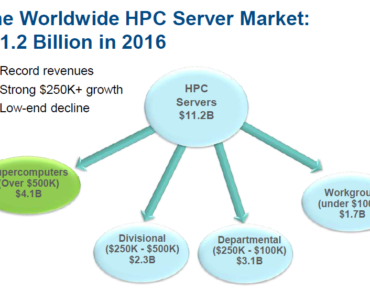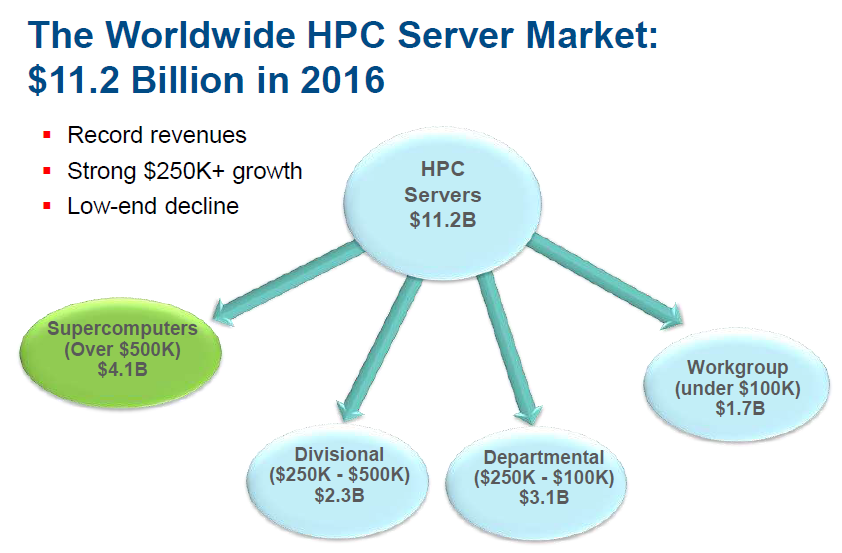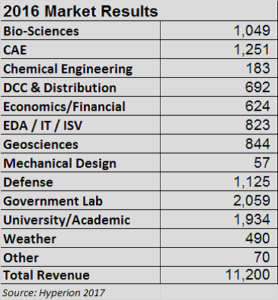Hyperion HPC Market Update: ‘Decent’ Growth Led by HPE; AI Transparency a Risk Issue

The HPC market update from Hyperion Research (formerly IDC) at the annual SC conference is a business and social “must,” and this year’s presentation at SC17 played to a SRO crowd at a downtown Denver hotel. This writer has attended several of these breakfasts, and looking back, one year to the next, at the major industry trends identified by Hyperion reveals how incredibly fast advanced scale computing is changing.
For example, two years ago at SC15 in Austin, our coverage shows there was not a single mention of AI, machine learning or deep learning. This year, AI is the air we breathe, with the market straining to blast past HPDA into machine learning and deep learning to the point where Hyperion devoted significant time this morning to sounding warning calls about the power of AI and how lack of transparency threatens its future.
But before getting into that, let's first look at Hyperion’s industry update.
Earl Joseph, Hyperion CEO, portrayed 2016 showing “some decent growth” for HPC server sales, growing to $11.2 billion worldwide, with strongest growth in the sector comprising systems priced at $250,000 and more. While the first half of 2017 shows an overall market decline of 3.5 percent, to $5.1 billion, Joseph said the first two quarters typically are softer than the second half of the year.
 In the vendor race, HPE has a significant lead with a 36.8 percent share, followed by Dell EMC with 20.5 percent, Lenovo at 7.8 percent and IBM at 4.9 percent. Nearly half of global HPC server sales are in North America, and X86 processors are used in nearly 75 percent of HPC servers sold worldwide.
In the vendor race, HPE has a significant lead with a 36.8 percent share, followed by Dell EMC with 20.5 percent, Lenovo at 7.8 percent and IBM at 4.9 percent. Nearly half of global HPC server sales are in North America, and X86 processors are used in nearly 75 percent of HPC servers sold worldwide.
Hyperion has also studied the proliferation of HPC and its economic impact. Bob Sorensen, VP of research and technology, reported that there are nearly 800 HPC sites in the U.S. He also said a recent Hyperion study shows that HPC-reliant US economic sectors contribute almost 55 percent of the GDP to the US economy, encompassing $9.8 trillion and accounting for over 15.2 million jobs.
Joseph said that while the high end of the HPC market has shown the strongest health with a relatively weak lower end, looking ahead, it will be the mid-market that will drive the industry to $14.8 billion by 2021, which Joseph called “fairly healthy growth.”
He also noted the spiky nature of the supercomputing industry, pointing out that three or four exascale-class machines are scheduled to be delivered in 2021 followed by only one or two in subsequent years, resulting in the industry showing “unbelievable growth followed by decline.”
 Hyperion also analyses the industry by vertical sectors. The national labs, academia and the Department of Defense comprise nearly half of the total market, with CAE and bio-sciences representing the largest commercial sectors.
Hyperion also analyses the industry by vertical sectors. The national labs, academia and the Department of Defense comprise nearly half of the total market, with CAE and bio-sciences representing the largest commercial sectors.
From a revenue perspective, AI (broadly defined) offers strong market potential. Senior research VP Steven Conway said Hyperion forecasts a rapid ramp up to $1.2 billion by 2021. But AI – particular its black box nature – is a double edged sword.
But problems of learning machine transparency pose a threat to the future of the nascent AI market.
He explained the “gigantic” difference between deep learning and machine learning. “With machine learning, you train the computer to do some things, and then it does them. With deep learning, you train the computer and then it goes beyond the training and learns on its own.”
He quoted recent warnings by Stephen Hawking that the development of AI “is one of the pivotal moments in human history,” and he cited Dr. Eng Lim Goh of HPE to the effect that “we humans can’t teach computers how to think like we do because we don’t know how humans think. So they (computers) think the way they do. That’s a big difference. They can think on their own. And they’re really capable of culture, of learning from each other – that’s been demonstrated.”
While the opacity of deep learning systems raises the dystopic specter of machines moving beyond human control, the more immediate problem of transparency is trust. Citing the famous case earlier this year of Google admitting it didn’t understand how its AlphaGo system defeated the world champion Go player, Conway said it’s one thing to not know how a machine won a board game and another to entrust your life, literally, to a computer – i.e., an autonomous car or AI-driven medical treatment.
“The problem with deep learning today is that in many instances it’s a black box phenomenon, and that needs to change,” Conway said.
![]() In Germany, he said, the first national law has been passed that puts restrictions and imposes ethical standards on autonomous vehicles. Based on the work of a 14-person ethics commission the law requires that self-driving cars must allow humans to take over control of the car. Further if its proven that the car was in control when an accident occurred then the automaker is liable; if a person was in control then the driver is liable.
In Germany, he said, the first national law has been passed that puts restrictions and imposes ethical standards on autonomous vehicles. Based on the work of a 14-person ethics commission the law requires that self-driving cars must allow humans to take over control of the car. Further if its proven that the car was in control when an accident occurred then the automaker is liable; if a person was in control then the driver is liable.
In addition, autonomous cars in Germany will not be programmed to make “demographic” ethical decisions along the lines of letting an elderly person die rather than a baby.
In the U.S., Conway said, more limited steps have been taken to hold autonomous cars accountable, with the National Highway Transportation Safety Administration issuing a document requiring a “black box” in self-driving vehicles similar to those on airplanes that enable post facto reconstruction of accidents.
“When, as inevitably will happen, we start seeing some self-driving vehicles where they can’t avoid an accident and there’s injury or death involved, particularly in the early years, then insurance companies, automakers and families will want to know how it happened, why it happened,” Conway said.
AI accountability also is a major issue in the medical profession – if treatments fail that are based on deep learning system recommendations, then questions will be asked. Conway said another key concern with precision medical systems, such as IBM Watson, is that the data selected to train the system can be flawed due to human bias.
Hyperion also announced a mapping project that tracks the nearly 800 HPC sites around the country, along with an initiative to study the emergence of quantum computing. The company also announced the winners of its HPC user and vendor innovation awards.










